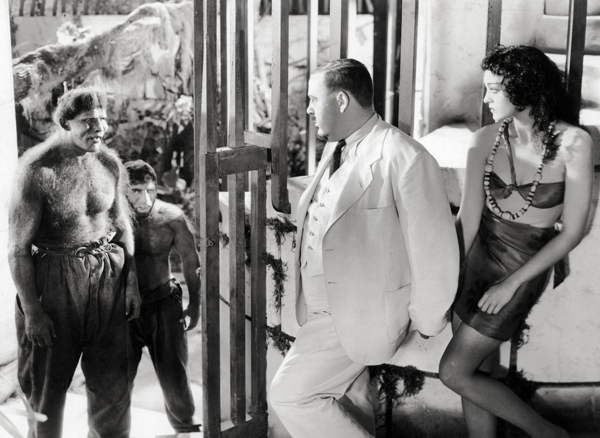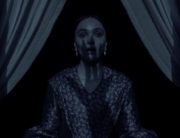
Charles Laughton's Dr. Moreau protecting Kathleen Burke's Lota (Photo: Criterion Collection)
Directed by Erle C Kenton
Written by Philip Wylie & Waldemar Young, based on The Island of Doctor Moreau by H. G. Wells
Released by Criterion Collection
USA. 70 min. Not rated
With Charles Laughton, Richard Arlen, Leila Hyams, Bela Lugosi, Kathleen & Arthur Hohl
Special Features: New digital restoration of the uncut theatrical version. Audio commentary featuring film historian Gregory Mank. Conversation between filmmaker John Landis, Oscar-winning makeup artist Rick Baker, and genre expert Bob Burns. Interviews with horror film historian David J. Skal; filmmaker Richard Stanley, the original director of the ill-fated 1996 adaptation; and Gerald Casale and Mark Mothersbaugh of the band Devo. Short 1976 film by Devo, featuring the songs “Secret Agent Man” and “Jocko Homo.” Stills gallery. Trailer. Booklet featuring a new essay by writer Christine Smallwood.
This influential pre-code adaptation of H.G. Wells’ 1896 novel The Island of Doctor Moreau jauntily dispenses with the book’s concerns about the bestiality of man and instead prefers to focus on, well, bestiality. Shipwrecked groom-to-be Edward Parker (Richard Arlen) is left stranded on a mysterious island in the South Seas, peopled by hideous “natives”—ugly extras with lots of fake facial hair and some dirty rubber masks, all led by an artificially hirsute Bela Lugosi. These poor creatures are victims of the eponymous doctor and his guilt-ridden assistant, the failed medical student Montgomery (Arthur Hohl), who have conducted horrifying experiments on animals to turn them into humans (in the “House of Pain”).
Dr. Moreau (Charles Laughton) decides to take advantage of the arrival of Edward, who improbably was on his way to meet his plucky blonde fiancée before getting marooned. He traps him on the island, hoping in time Edward will get fresh with his best creation, the daringly-clad-for the-1930s Lota (Kathleen Burke, credited as “Panther Woman.”). Not realizing there’s a whole subculture around these forbidden unions, Moreau reasons, if he’s willing to sleep with her, it means she’s fully human.
Directed by studio workhorse Erle C. Kenton and co-written by pulp author Philip Wylie and Waldemar Young, a grandson of Brigham Young, this taut tale is a master class in the virtues of thrift lost by most modern filmmakers. True to its Depression roots, nothing is wasted, and it hacks along in less time than a typical episode of Boardwalk Empire. Among its many pleasures are witnessing genre conventions taking shape before your very eyes—the doctor who plays God, the fog-enshrouded island home to noxious experiments (and apparently, even the line “The natives are restless,” according to the very informative booklet that comes with the DVD). There is a barmy misunderstanding of evolution—according to Moreau, animals are “striving” to evolve into men. But this is no museum piece, thanks in part to Laughton, who, with his fat, dimpled face and look of spoiled complacency, comes across as the world’s creepiest mischievous child.
DVD Extras: Criterion Collection does its usual thorough job of packing the DVD with film geek goodies, including interviews with horror great John Landis (An American Werewolf in London), who considers the film more horrific than 1931’s Frankenstein (though strangely subtle), and Richard Stanley, the original helmer of the atrocious 1996 remake (which is best remembered for introducing the world to the tiny actor who would go on to play Mini-Me in the Austin Powers films). Historian and documentary filmmaker David J. Skal places Wells’s novel in context with other Victorian horror novels, and even points out the influence of Oscar Wilde’s 1895 trial for indecency on the original novel—he believes Laughton was channeling Wilde in his performance. Gregory Mank’s commentary, much livelier than the average, pinpoints what scenes from the film were cut, both in the U.S. and internationally, and why. Responding to the film’s U. K. ban (until 1958), Laughton’s wife, actress Elsa Lancaster, is said to have responded: “Of course it’s against nature, so is Mickey Mouse.”
Perhaps more interesting is a section devoted to the band Devo, the “de-evolutionary band,” which amazingly claims it was inspired by the film. In a deeply weird 1976 experimental video, the band runs through its flagship tune “Jocko Homo,” with its own spin on one of Lost Souls’ most famous lines: “Are we not men?” The band, wearing sunglasses and with stockings pulled over their heads, asks this rhetorically. No, they answer: “We are Devo.” Also be sure to stick around for the interview with Devo’s founders, which proves to be a cocktail party factoid goldmine. Did you know that in the early 1970s, before heading out to California to make pornos, Paul Thomas Anderson’s dad hosted a late-night TV show in the Midwest in which he played a beatnik named “Ghoulardi” and that he superimposed himself on old B-movie footage? Thanks to Criterion Collection, now you do.
















Leave A Comment